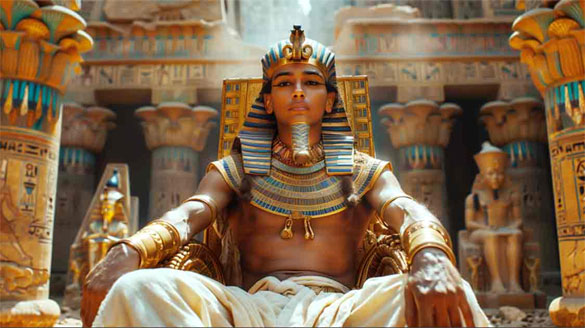The Pharaoh Complex: A Psychological Portrait of an Autocrat

By
V.A. Mohamad Ashrof, New Age Islam
3 June 2024
2024
The Quran Paints A Vivid Portrait Of Pharaoh As
The Quintessential Autocrat, Whose Despotic Rule Was Marked By Brutality,
Arrogance, And A Relentless Grip On Power. By Examining Specific Quranic
Verses, One Can Gain Insight Into The Psychology Of This Historical Figure,
Whose Actions And Mind-Set Embody The Traits Of A Dictator Consumed By
Self-Interest And A Blatant Disregard For Human Dignity And Justice.
-------

Phaaoh/ Source:
https://www.ancient-origins.net/history-ancient-traditions
------
The Quranic
narrative of Pharaoh in Egypt offers a chilling glimpse into the psyche of an
autocrat. Through his actions and pronouncements, we can discern the hallmarks
of an autocratic personality: a thirst for absolute power, a disdain for the
people he rules, and a deep-seated resistance to any challenge to his
authority.
The Quran
paints a vivid portrait of Pharaoh as the quintessential autocrat, whose despotic
rule was marked by brutality, arrogance, and a relentless grip on power. By
examining specific Quranic verses, one can gain insight into the psychology of
this historical figure, whose actions and mind-set embody the traits of a
dictator consumed by self-interest and a blatant disregard for human dignity
and justice.
1.
Cruelty and Oppression:
Pharaoh's
rule is characterized by extreme cruelty and oppression. In Surah Al-Baqarah
(2:49) and Surah Al-A'raf (7:141), it is recalled how Pharaoh inflicted severe
torment on the Israelites, killing their sons and sparing their women. This act
of genocide and gender-based oppression highlights a tactic often employed by
tyrants to instil fear, suppress dissent, and control the population. Pharaoh’s
treatment of the Israelites exposes his utter disregard for human life. He
orders the slaughter of male infants (28:4) and enslaves the entire population
(26:22). This cruelty underscores his view of the people he rules as mere pawns
in his game of power.
2.
Rejection of Divine Signs and Arrogance:
Pharaoh's
response to Moses and the signs sent by God is one of arrogant rejection. In
Surah Al-A'raf (7:103), Pharaoh and his chiefs wrongfully reject the divine
signs, demonstrating a profound arrogance and a refusal to acknowledge a higher
authority. This is further emphasized in Surah Yunus (10:88), where Moses
highlights how Pharaoh and his chiefs misuse their splendour and wealth to lead
people astray, signifying their deep-seated hubris. Pharaoh views himself as an
unquestionable authority. He refuses to acknowledge Moses' divinely ordained
mission, dismissing him as a power-hungry magician (20:63). This arrogance
blinds him to reality, leading him to double down on his oppression in the face
of mounting signs from God (7:132-135).
3.
Manipulation and Deception:
Pharaoh's
manipulation is evident in how he frames Moses' actions as a threat to his
rule. In Surah Al-A'raf (7:110) and Surah Ta-Ha (20:63), Pharaoh portrays
Moses' mission as a conspiracy to drive the Egyptians out of their land and
destroy their way of life. This tactic of creating an external enemy to unify
his people under his oppressive regime is a classic move by dictators to
legitimize their harsh measures and retain power. Despite initial concessions
when faced with divine plagues (7:132-135), Pharaoh inevitably breaks his
promises, clinging to his delusions of grandeur. This pattern of deception
ultimately leads to his downfall (7:135).
4.
Brutal Suppression of Dissent:
Pharaoh's
brutal response to any form of dissent is evident in several verses. In Surah
Al-A'raf (7:123-124) and Surah Ta-Ha (20:71), Pharaoh threatens severe
punishments, including mutilation and crucifixion, for those who believe in
Moses without his permission. This merciless approach to quashing opposition
underscores his reliance on fear and violence to maintain control.
5.
Injustice and Broken Promises:
Pharaoh's
injustice is further highlighted in Surah Al-A'raf (7:132-135), where despite
witnessing clear signs and promising to release the Israelites if the plagues
were removed, he repeatedly breaks his word once the calamities are lifted.
This duplicity and lack of integrity reflect the selfishness and moral bankruptcy
typical of autocratic rulers.
6.
Exploitation of Power:
In Surah
Al-Qasas (28:4), Pharaoh is described as someone who exalted himself in the
land and divided its people into factions, oppressing a sector among them. This
divide-and-rule strategy is a hallmark of autocracy, aimed at weakening
collective resistance and ensuring absolute domination. Pharaoh attempts to
manipulate religion to serve his own ends. He accuses Moses of using magic to
undermine the established gods (20:71), deflecting blame from himself and
consolidating his own power through religious control.
7.
Blaming and Scapegoating:
Pharaoh's
tendency to blame external factors for his problems is seen in Surah Al-A'raf
(7:131), where he attributes any misfortune to Moses and his followers. This
scapegoating is a psychological strategy used by dictators to deflect criticism
and consolidate their base by channelling public frustration towards a
convenient enemy.
8.
Psychological Warfare and Intimidation:
In Surah
Ash-Shu'ara (26:49), Pharaoh uses psychological warfare to intimidate the
believers, threatening severe physical punishment to deter them from their
faith. His tactic of inflicting psychological terror complements his physical
oppression, creating an environment of constant fear and submission.
9.
Self-Preservation and Paranoia:
Pharaoh's
primary concern is maintaining his own control. Verses like 7:110 depict him
fearing that Moses and his followers will drive him out of his land. This
paranoia fuels his brutality, as seen in 7:127 where he proposes killing the
sons of the Israelites to nip the threat in the bud.
10.
Fear of the Other:
Pharaoh's
insecurity manifests in his fear of outsiders like Moses. He perceives new
ideas and movements as a threat to his established order (10:88). This xenophobia
fuels his persecution of those who dare to challenge him.
The story
of Pharaoh serves as a timeless warning against the dangers of autocratic rule.
It exposes the destructive consequences of unchecked power, reminding us of the
importance of just leadership and accountability to the people. The Quranic
depiction of Pharaoh provides a profound insight into the psychology of a
dictator. His reign was marked by extreme cruelty, arrogance, manipulation, and
a relentless pursuit of power. Pharaoh's actions illustrate how autocrats
exploit fear, division, and deception to maintain their rule, often at the
expense of justice and humanity. These characteristics serve as a timeless
reminder of the dangers of unchecked power and the importance of justice and compassion
in leadership.
----
V.A. Mohamad Ashrof is an independent Islamic
humanist scholar from India who regularly publishers’ articles and papers in
Islam and contemporary affairs.
URL: https://www.newageislam.com/debating-islam/pharaoh-complex-psychological-autocrat/d/132434
New Age Islam, Islam Online, Islamic Website, African Muslim News, Arab World News, South Asia News, Indian Muslim News, World Muslim News, Women in Islam, Islamic Feminism, Arab Women, Women In Arab, Islamophobia in America, Muslim Women in West, Islam Women and Feminism
